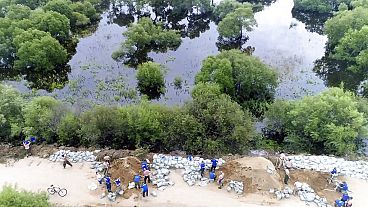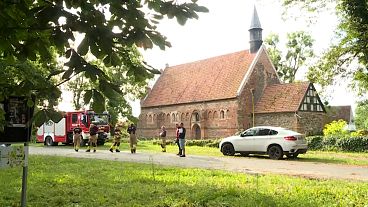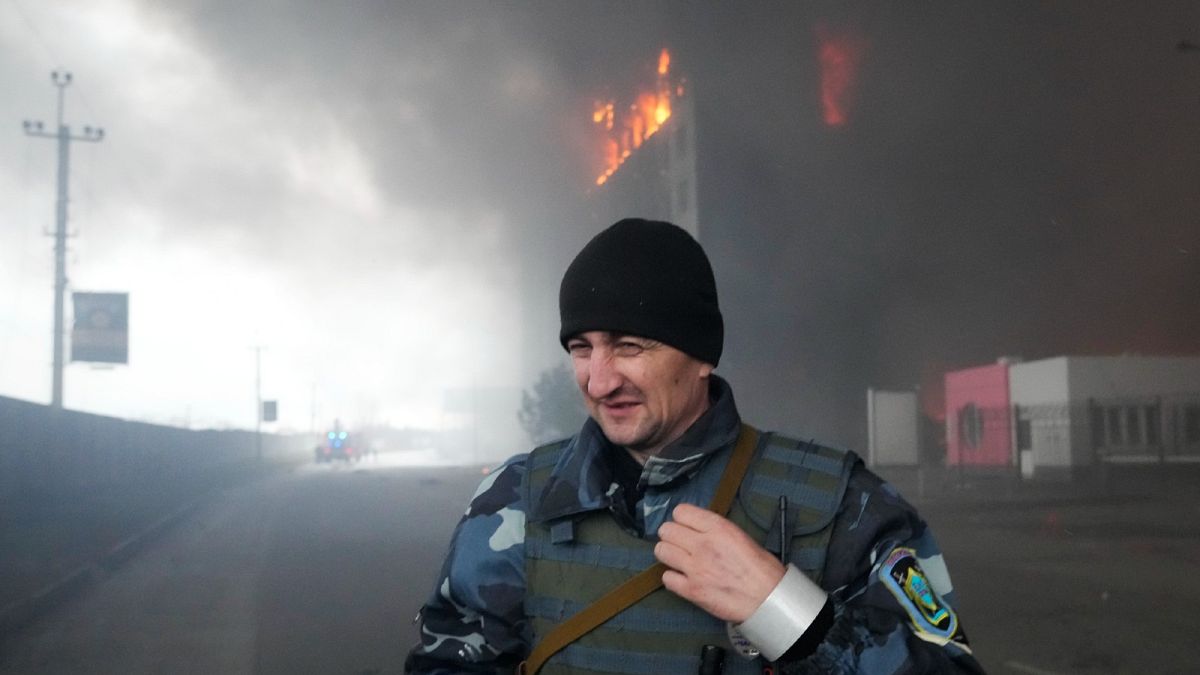Some central and eastern Europeans point out that western European countries are the main trading partners with Russia and China.
For years, political leaders across central and eastern Europe have warned about the immediate dangers posed by Russia and now -- amid Moscow's invasion of Ukraine -- some blame western Europeans for not heeding those warnings.
A day after Russia attacked, Ukrainian President Volodymyr Zelenskyy lashed out at the apparent lack of western support provided to his government, despite Russian troops massing on Ukraine’s borders for months.
“This morning we are defending our state alone. Like yesterday, the world’s most powerful forces are watching from afar,” he said. “Did yesterday’s sanctions convince Russia? We hear in our sky and see on our earth that this was not enough.”
The following day, Zelenskyy accused several western European governments of “egotism,” “arrogance” and “appeasement” in their response to the Russian military buildup.
Several central and eastern European leaders, who for years have been warning about the dangers posed by Russia, were equally scathing.
“There is no time today for the kind of unyielding egoism that we see in certain Western countries, including here in Germany unfortunately,” Polish Prime Minister Mateusz Morawiecki said in Berlin last week ahead of a meeting with German Chancellor Olaf Scholz.
'I smell Munich here'
Ever since Russia began massing its troops on Ukraine’s borders in November, the go-to analogy for analysts and politicians was the Munich agreement, when in 1938 France and Britain tried to avoid conflict with Nazi Germany by ceding the Sudetenland from Czechoslovakia.
"I hope I’m wrong but I smell ‘Munich’ here," Marko Mihkelson, head of the foreign affairs committee in Estonia’s parliament, said last December.
The frustration felt by some central and eastern Europeans isn’t new.
For years, they have considered themselves overlooked within EU meetings and isolated in calling for a stronger NATO. Croatia, Estonia, Latvia, Poland, Lithuania and Romania are some of the 10 NATO states -- out of 30 -- that actually spend the mandated 2% of GDP on defence.
Several states, not least Hungary, have been accused of undermining European solidarity and splitting the bloc with their relations with Moscow and Beijing, yet central and eastern Europeans point out that western European countries are the main trading partners with Russia and China.
Poland, Ukraine and the Baltic states have been committed opponents of the Nord Stream 2 pipeline — which directly connects Russia to Germany, the main European purchaser of Russia’s natural gas exports. Yet successive German governments continued with this planned energy project, despite it massively increasing German reliance on Moscow.
Last week Scholz moved to suspend the certification of Nord Stream 2 following Russia's invasion of Ukraine.
There was little in the way of European solidarity after the Czech Republic last year expelled more than a dozen Russian officials after Czech intelligence agencies linked Russian military agents to a massive ammunition depot explosion near Vrbetice in October 2014, the “largest explosion on European soil since the Yugoslav wars,” according to an analyst.
'Soul-searching and accusations'
There is also frustration at the “persistently futile attempts” by French President Emmanuel Macron, to mediate central and eastern European concerns with Russia, added Kevin Curran, of the Association for International Affairs, a Prague-based think tank.
“On all of these points and more, many central and eastern European leaders and citizens will feel compelled to gloat about their warnings that fell on deaf ears for so many years. In many respects, this is justified,” Curran added.
Richard Q. Turcsányi, of Palacky University Olomouc, described the Russian invasion as having surprised many analysts. “What is clear, however, is that those who have been warning about Russia as a security threat will have their moment – many of them being central and eastern European countries,” he said.
“Countries in western Europe used to have a more cooperative attitude [towards Russia], which will obviously change a lot now,” Turcsányi said, noting that the German government was quick last week to postpone the Nord Stream 2 pipeline project. Defying some expectations, Western democracies also agreed last weekend to exclude a number of Russian banks from Swift, an international payment system.
“There will naturally be some soul-searching and accusations of who was right and wrong all the time, but I don’t think this is a particularly useful avenue of thinking,” Turcsányi added.
Other central and eastern European commentators are in agreement.
“The indecisiveness of the West and the unwillingness to punish Russia for its previous aggression is certainly the reason why Vladimir Putin felt it (would) be plausible to attack Ukraine,” said Veronika Víchová, head of the Kremlin Watch Programme at the European Values Centre for Security Policy, a think-tank.
For years, Putin has become bolder and bolder, and the West kept signalling that it will not be putting adequate costs on such aggressive behaviour, she added.
But “a blame game” will not solve the situation right now,” Víchová said. “It is up to the transatlantic democratic world to realise that Russia is not interested in forthcoming diplomacy and that only strictly targeted and impactful sanctions have a chance to make a difference.”
Not all eastern and central states were wary of Russia
Curran, of the Association for International Affairs, noted that it cannot be forgotten that the likes of Serbia, Hungary, and Slovakia have in recent history found themselves to be quite supportive of Russian narratives.
“We cannot revise central and eastern European narratives to have been universally wary of Russia,” he said.
Indeed, the narrative that western Europe was too soft on Russia, and failed to listen to warnings from central and eastern Europe, is more complex.
Hungary’s autocratic prime minister, Viktor Orban, has been a key ally of Putin’s. Milos Zeman, the Czech president, has been known for taking pro-Russia positions since his election in 2013.
Regarding the Russian annexation of Crimea from Ukraine in 2014, Zeman later described it as “irreversible” and called for European governments to end their sanctions on Moscow.
Zeman questioned his own country’s intelligence agencies when they said last year that they believed Russian actors were behind the Vrbetice explosion, stating that his country should avoid “hysteria” and “speculation” over Russia’s alleged involvement.
Another regional politician who has often taken a pro-Russia agenda is the former Slovakian prime minister, Robert Fico, who also opposed sanctions on Moscow after the 2014 annexation of Crimea.
It isn’t just political elites. A survey published late last month by Focus, a pollster, found that 44% of Slovaks believed the US and NATO were responsible for the rising tension in Ukraine, and only 34% believed Russia was to blame. Results differed massively by age groups, however, with more Slovaks aged 25-34 blaming Russia than NATO and the US, while those 65 and over were less likely to hold Russia responsible.
Ukraine invasion might change their mind
Analysts reckon it could now be much harder for central and eastern Europe’s pro-Russian politicians to keep up their stance. “I expect some of them would double-down in their positions, but some would change their mind,” said Turcsányi, of Palacky University Olomouc.
On 24 February, just hours after Russia launched its full-scale invasion of Ukraine, Czech President Zeman called Russia’s actions “an unprovoked act of aggression” and a “crime against peace”, and demanded not just words but deeds from the Czech government.
He also admitted he had been wrong about Moscow. “A few days ago, I said that the Russians were not crazy and that they would not attack Ukraine. I admit I was wrong.
"The irrational decision of the leadership of the Russian Federation will cause significant damage to the Russian state itself,” he was quoted saying.
More surprising, Hungarian Prime Minister Orban was quick to condemn Moscow.
“Russia attacked Ukraine this morning with military force,” Orban said in a video on Facebook last Thursday. “Together with our European Union and NATO allies, we condemn Russia’s military action.”
Orban’s foreign minister, Peter Szijijarto, added that “Hungary’s position is clear: we stand by Ukraine, we stand by Ukraine’s territorial integrity and sovereignty.”
The governments of almost all central and eastern European states, including Bulgaria and Romania, have now explicitly condemned Putin’s invasion. Even Aleksandar Vucic, the Serbian president, a very close Moscow partner, described Russia’s violation of Ukraine’s territorial integrity as “very wrong,” although Belgrade opposes sanctions on Moscow.
“It is from this that a more united voice will be able to emerge across Central and Eastern Europe,” Curran said.
“This voice, now in unison, will surely be heard across Western Europe. In my estimation, these voices must not go back in time to gloat over previous warnings, but instead turn to the important next steps.”












